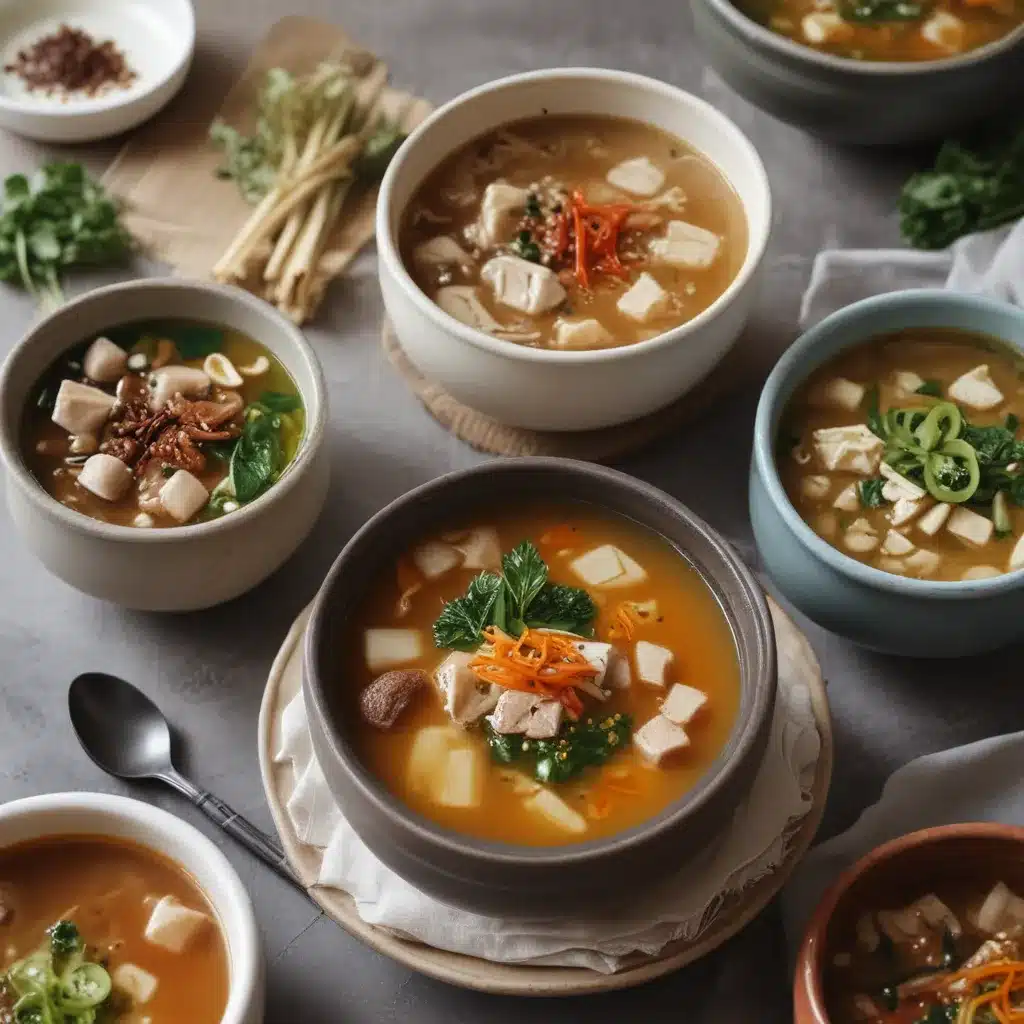
The Cozy Comfort of Korean Soups
As the temperatures start to dip and the days grow shorter, there’s nothing quite like a steaming hot bowl of soup to warm you from the inside out. And when it comes to soothing the soul on a chilly New England day, Korean cuisine has a wealth of delicious and comforting options to explore.
You see, I’ve always been a bit of a soup aficionado. There’s just something so nourishing and satisfying about cradling a piping hot bowl in your hands, inhaling the fragrant aromas, and letting the flavors dance across your palate. And when it comes to Korean soups, the depth of flavor and the ability to soothe both body and mind is truly unparalleled.
Perhaps it’s the way the savory broth is simmered for hours, extracting every last bit of umami essence from the ingredients. Or maybe it’s the careful balancing act of spices, herbs, and seasonings that creates a symphony of complementary tastes. Whatever the secret, I can say with certainty that Korean soups have become a staple in my household, especially as the mercury starts to plummet.
The Warming Wonders of Guk and Jjigae
Now, when it comes to the world of Korean soups, there are two main categories that I find myself gravitating towards: guk and jjigae. Guk, or clear soups, are often light and broth-based, while jjigae are thicker, stew-like concoctions that pack a real punch of flavor.
Take, for example, the classic Doenjang Guk, a soybean paste soup that’s a staple in Korean households. The deep, earthy broth is the perfect canvas for an array of hearty vegetables, from tender potatoes and onions to robust zucchini and spinach. And the addition of a soft-boiled egg to top it off? Pure bliss.
Or how about the fiery and dynamic Kimchi Jjigae, which showcases the bold and tangy flavors of fermented cabbage? The spicy broth is teeming with tender pork, silky tofu, and, of course, that signature kimchi kick. It’s a dish that’s sure to clear your sinuses and warm you to the core.
And let’s not forget about the comforting Galbi Jjim, a braised short rib stew that’s nothing short of a culinary masterpiece. The tender, fall-off-the-bone meat is simmered to perfection in a savory-sweet sauce, creating a dish that’s both rich and incredibly satisfying.
Exploring the Regional Diversity of Korean Soups
But the wonders of Korean soups don’t stop there. As I’ve delved deeper into this culinary tradition, I’ve been struck by the incredible regional diversity that exists. Each corner of the Korean peninsula seems to have its own unique take on these comforting and nourishing dishes.
Take, for instance, the Gomtang of the northern regions. This beef bone broth soup is renowned for its silky, translucent broth and the way it melts in your mouth. The slow-simmered bones impart a depth of flavor that’s simply unmatched, and the addition of tender brisket or short rib makes for a truly indulgent experience.
Down south, you’ll find the Maeuntang, a spicy fish stew that’s a specialty of the coastal Busan region. This fiery concoction features a variety of fresh seafood, from plump shrimp and tender whitefish to briny clams and mussels. The broth is a symphony of chili peppers, garlic, and fragrant scallions, creating a dish that’s both invigorating and irresistible.
And let’s not forget about the Kongbap of the Jeju Island, a unique soup-rice hybrid that’s a true delight for the senses. The base is a thick, bean-based broth that’s then ladled over a bed of steaming white rice, creating a comforting and nourishing meal that’s both satisfying and versatile.
Bringing the Warmth of Korean Soups to Boston
As a devoted lover of all things Korean cuisine, I’ve been thrilled to see the growing popularity of these soothing and satisfying soups here in Boston. Sure, we may be a far cry from the bustling streets of Seoul, but the city’s vibrant Korean community has ensured that we can still indulge in these culinary treasures.
One of my personal favorite spots to enjoy a bowl of Korean soup is Korean Garden Boston. This cozy little spot in the heart of the city has become a true haven for those of us seeking comfort and warmth on a chilly New England day. Whether I’m craving the rich and hearty Galbi Jjim or the light and refreshing Gomtang, the team at Korean Garden always delivers with dishes that are both authentic and utterly delectable.
But it’s not just the food that makes Korean Garden so special – it’s the sense of community and connection that permeates the space. The owners, Yoon and Ji, have created an atmosphere that is both welcoming and deeply rooted in Korean tradition. As I sip my steaming hot soup, I can’t help but feel a sense of camaraderie with the other patrons, all of us coming together to share in the warmth and comfort of these beloved dishes.
A Soulful Journey Through Korean Soups
And you know, as I’ve delved deeper into the world of Korean soups, I’ve come to realize that these dishes are about so much more than just satisfying our hunger. They’re a reflection of the rich cultural heritage and the deeply ingrained traditions of the Korean people.
Each spoonful is a portal to a different time and place, a way to connect with the flavors and aromas that have been passed down through generations. It’s a culinary journey that transports me to bustling markets, cozy family homes, and the breathtaking landscapes of the Korean countryside.
But perhaps the most poignant aspect of these soups is the way they have the power to soothe the soul. There’s something about the way the broth warms you from the inside out, the way the flavors seem to wrap you in a comforting embrace. It’s a sensation that transcends mere sustenance, connecting us to a deeper, more primal sense of well-being and contentment.
So, as the chill of winter settles in and the days grow shorter, I find myself drawn to the cozy comfort of Korean soups. Whether it’s the robust and earthy Doenjang Guk or the fiery and dynamic Kimchi Jjigae, these dishes have become a cherished part of my culinary repertoire – a way to nourish both my body and my soul on the coldest of days.
And I can’t help but feel that I’m not alone in this. As the popularity of Korean cuisine continues to soar, more and more people are discovering the transformative power of these soothing and satisfying soups. So, why not join me on this culinary journey? Grab a spoon, dive in, and let the warmth and comfort of these beloved dishes envelop you.
